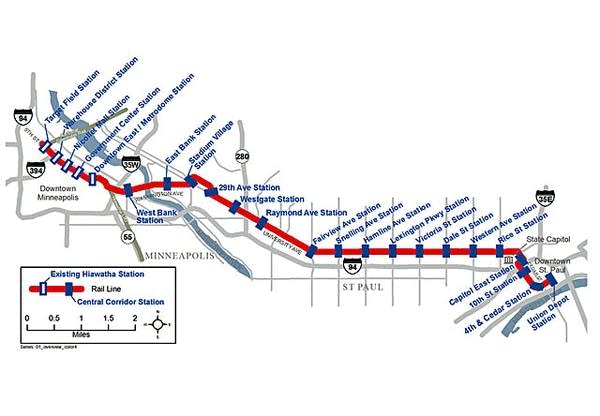St. Paul fronts money for University Avenue parking headaches
Go Deeper.
Create an account or log in to save stories.
Like this?
Thanks for liking this story! We have added it to a list of your favorite stories.

St. Paul city planners have identified about $1 million that could go toward relieving an expected parking crunch on University Avenue -- and perhaps help soothe a sore spot with merchants along the corridor.
The City Council is expected to pass a measure today that would steer some of that money to the parking needs in anticipation of the proposed Central Corridor light-rail project, which would eliminate 85 percent of the street parking on University Avenue.
The 11-mile, nearly $1 billion transit project would connect St. Paul to Minneapolis along University Avenue and is scheduled to begin construction in 2010.
Planners with the Metropolitan Council, the agency overseeing the light-rail project, don't have funding to pay for parking solutions, so it's up to the city to improve the situation to try to retain small businesses on the thoroughfare.
Turn Up Your Support
MPR News helps you turn down the noise and build shared understanding. Turn up your support for this public resource and keep trusted journalism accessible to all.
City Council Member Melvin Carter says the city should try to retain those merchants who have legitimate concerns about parking. A staff report identified 11 hot spots along the corridor where parking will be especially tight.
"We have so many small businesses on University Avenue who rely not on big parking lots, but sort of need one spot right in front for that customer who comes out at 1 o'clock on a Tuesday to park and walk into their store," Carter said.

Much of the money would help business owners pay for improving their private, off-street lots. Carter says some of the loss in street parking can be alleviated by asking businesses to share those spaces. As part of the proposed parking program, merchants could each apply for up to $25,000 to pay for lot improvements such as lighting and repaving. There is no limit for businesses that will share their lots.
The new money would also help pay for alley repaving and other improvements.
"We don't know what kind of interest there's going to be," said city planner Craig Blakely. "But we have at least some money, a program and a strategy that will make a dent in the problem."
Mayor Chris Coleman said in his budget address Tuesday that he was committed to working with City Council members Russ Stark and Melvin Carter on the issue.
In a statement to be released today, the mayor said "Central Corridor is the opportunity of a lifetime, but we must take steps to ensure this $1 billion development opportunity benefits those who have already invested in the avenue. Helping businesses develop plans to deal with the loss of parking spots on University Avenue is the right thing to do."
Linda Winsor of the University Avenue Business Association said the proposed cash is "a first really good step in the right direction, but it's not comprehensive enough to offset the total loss of on-street parking."
City planners say they're working on other approaches as well. They've bandied about ideas ranging from installing parking meters to high-tech parking enforcement.
Other concerns voiced by businesses and residents yet to be addressed by project planners include three potential stops -- at Hamline Avenue, Victoria Avenue and Western Avenue -- that as of now will not be fully constructed. Lack of funds is cited as the main reason, but some infrastructure for the stops will be installed.



